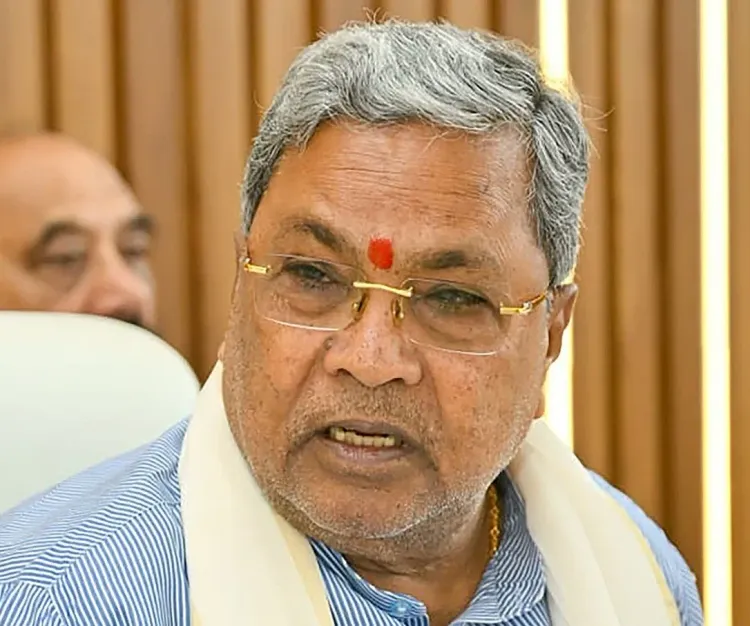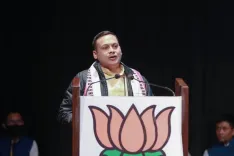Is BBMP Being Replaced by the Greater Bengaluru Authority?

Synopsis
Key Takeaways
- New Governance Structure: The BBMP is being replaced by the Greater Bengaluru Authority.
- Administrative Efficiency: Plans for three city corporations are underway.
- Leadership: The Chief Minister will chair the new authority.
- Legislative Approval: The Greater Bengaluru Governance Bill has passed in both legislative houses.
- Opposition Concerns: Critics argue about the bill's constitutionality.
Bengaluru, May 15 (NationPress) Karnataka Chief Minister Siddaramaiah has announced that Governor Thawarchand Gehlot has granted his approval for the Greater Bengaluru Governance Bill, which will officially take effect on Thursday.
The Bruhat Bengaluru Mahanagara Palike (BBMP) will be replaced by the newly established Greater Bengaluru Authority, according to the Chief Minister's statements made to the media at Vidhana Soudha in Bengaluru.
The Greater Bengaluru Bill has successfully passed through both Houses of the state legislature, he noted.
Bengaluru will now be referred to as Greater Bengaluru. There is potential to create at least three corporations within the Greater Bengaluru area. The Chief Minister will act as the chairperson of this authority, with relevant decisions forthcoming in the near future,” stated Siddaramaiah.
The Karnataka Government officially announced the creation of the Greater Bengaluru Authority (GBA) on Tuesday, signaling the dissolution of the BBMP as the city's governing body. The state government confirmed that the land previously governed by the BBMP will now fall under the jurisdiction of the GBA, according to Section 1 (2) of the Greater Bengaluru Governance Act, 2024.
During the transition, the existing officials will continue to perform their duties within the BBMP. The Urban Development department has indicated that an administrator will be appointed once the BBMP is officially dissolved. Following this appointment, necessary rules and guidelines will be established.
According to the GBA Act, the authority chaired by the Chief Minister must be established within 120 days. The Bengaluru Development Minister will serve as the Vice President. Deputy Chief Minister D.K. Shivakumar oversees the Bengaluru Development portfolio.
Members will include local legislators, ministers from Bengaluru, mayors from various corporations, the Bengaluru Development Authority (BDA) Commissioner, the Bengaluru Water and Sewerage Board (BWSSB) President, and Managing Directors from the Bengaluru Metropolitan Transport Corporation (BMTC) and Bengaluru Metro Rail Corporation Limited (BMRCL), as well as Bengaluru Electricity Supply Company (Bescom) officials.
The Deputy Commissioner of the Bengaluru Urban District and the Bengaluru Police Commissioner will also be included as members.
Reports suggest that the government aims to establish three city corporations, each with 125 wards, and will delineate boundaries accordingly. As outlined in the act, all areas under the GBA will be classified as part of the Bengaluru region.
The Congress government in Karnataka introduced the Greater Bengaluru Governance Bill, 2024, in the Assembly on June 23, 2024, which proposes to divide the Bruhat Bengaluru Mahanagara Palike (BBMP) into several city corporations within the Greater Bengaluru Area.
The government's rationale for this Bill is to foster effective, participatory, and responsive urban governance in the Greater Bengaluru Area. Additionally, it seeks to create a Greater Bengaluru Authority to oversee and coordinate development in the region.
“The provisions of the Bruhat Bengaluru Mahanagara Palike Act, 2020 (Act 53 of 2020) are insufficient to govern Bengaluru, as they fail to establish institutions capable of addressing governance fragmentation due to the multitude of civic agencies and the lack of coordination among them,” the act states.
The BJP and JD(S) have expressed their opposition to the act's implementation. The BJP has organized protests and labeled the move unconstitutional, claiming it violates the 74th Constitutional Amendment. A formal appeal was also submitted to the Governor regarding this matter.






